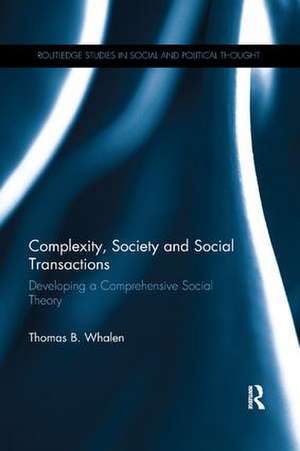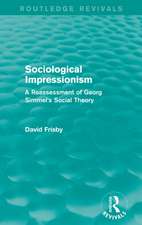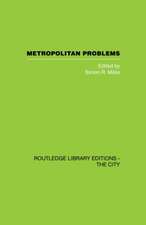Complexity, Society and Social Transactions: Developing a Comprehensive Social Theory: Routledge Studies in Social and Political Thought
Autor Thomas Whalenen Limba Engleză Paperback – 17 ian 2019
This social theory applied Bhaskar’s critical realism to refine the several theoretical works that were utilized. These include complex adaptive systems, Mead’s social theory, Maslow’s hierarchy of needs, Strauss’s negotiated order theory, game theory, Bruner’s narrative and folk psychology, Giddens's structuration theory and Ricoeur’s interpretation theory.
A transdisciplinary account of the emergence of society and culture and the role of narrative, Complexity, Society and Social Transactions will appeal to scholars and practitioners of social theory and sociology.
| Toate formatele și edițiile | Preț | Express |
|---|---|---|
| Paperback (1) | 347.24 lei 3-5 săpt. | +15.70 lei 6-12 zile |
| Taylor & Francis – 17 ian 2019 | 347.24 lei 3-5 săpt. | +15.70 lei 6-12 zile |
| Hardback (1) | 1000.27 lei 6-8 săpt. | |
| Taylor & Francis – 21 sep 2017 | 1000.27 lei 6-8 săpt. |
Din seria Routledge Studies in Social and Political Thought
-
 Preț: 152.42 lei
Preț: 152.42 lei -
 Preț: 296.64 lei
Preț: 296.64 lei -
 Preț: 380.89 lei
Preț: 380.89 lei -
 Preț: 310.96 lei
Preț: 310.96 lei -
 Preț: 287.67 lei
Preț: 287.67 lei -
 Preț: 347.92 lei
Preț: 347.92 lei -
 Preț: 303.87 lei
Preț: 303.87 lei -
 Preț: 333.32 lei
Preț: 333.32 lei -
 Preț: 309.82 lei
Preț: 309.82 lei -
 Preț: 324.20 lei
Preț: 324.20 lei -
 Preț: 221.84 lei
Preț: 221.84 lei -
 Preț: 310.41 lei
Preț: 310.41 lei -
 Preț: 319.01 lei
Preț: 319.01 lei -
 Preț: 311.70 lei
Preț: 311.70 lei -
 Preț: 319.08 lei
Preț: 319.08 lei -
 Preț: 311.41 lei
Preț: 311.41 lei -
 Preț: 338.98 lei
Preț: 338.98 lei -
 Preț: 216.44 lei
Preț: 216.44 lei -
 Preț: 279.47 lei
Preț: 279.47 lei -
 Preț: 387.02 lei
Preț: 387.02 lei - 18%
 Preț: 1110.47 lei
Preț: 1110.47 lei - 18%
 Preț: 1055.51 lei
Preț: 1055.51 lei - 18%
 Preț: 1058.43 lei
Preț: 1058.43 lei - 18%
 Preț: 1005.73 lei
Preț: 1005.73 lei - 25%
 Preț: 544.67 lei
Preț: 544.67 lei -
 Preț: 409.73 lei
Preț: 409.73 lei - 18%
 Preț: 1061.22 lei
Preț: 1061.22 lei - 18%
 Preț: 1061.84 lei
Preț: 1061.84 lei - 18%
 Preț: 1215.71 lei
Preț: 1215.71 lei - 18%
 Preț: 998.71 lei
Preț: 998.71 lei - 18%
 Preț: 1109.99 lei
Preț: 1109.99 lei -
 Preț: 488.71 lei
Preț: 488.71 lei - 30%
 Preț: 847.73 lei
Preț: 847.73 lei -
 Preț: 416.12 lei
Preț: 416.12 lei - 18%
 Preț: 1054.75 lei
Preț: 1054.75 lei - 28%
 Preț: 769.72 lei
Preț: 769.72 lei - 18%
 Preț: 1059.84 lei
Preț: 1059.84 lei -
 Preț: 489.99 lei
Preț: 489.99 lei - 18%
 Preț: 1062.31 lei
Preț: 1062.31 lei - 18%
 Preț: 1108.42 lei
Preț: 1108.42 lei -
 Preț: 382.65 lei
Preț: 382.65 lei - 42%
 Preț: 181.06 lei
Preț: 181.06 lei - 26%
 Preț: 822.36 lei
Preț: 822.36 lei - 18%
 Preț: 1219.38 lei
Preț: 1219.38 lei
Preț: 347.24 lei
Nou
Puncte Express: 521
Preț estimativ în valută:
66.44€ • 69.37$ • 54.99£
66.44€ • 69.37$ • 54.99£
Carte disponibilă
Livrare economică 14-28 martie
Livrare express 27 februarie-05 martie pentru 25.69 lei
Preluare comenzi: 021 569.72.76
Specificații
ISBN-13: 9780367208301
ISBN-10: 036720830X
Pagini: 182
Ilustrații: 16
Dimensiuni: 156 x 234 x 10 mm
Greutate: 0.27 kg
Ediția:1
Editura: Taylor & Francis
Colecția Routledge
Seria Routledge Studies in Social and Political Thought
Locul publicării:Oxford, United Kingdom
ISBN-10: 036720830X
Pagini: 182
Ilustrații: 16
Dimensiuni: 156 x 234 x 10 mm
Greutate: 0.27 kg
Ediția:1
Editura: Taylor & Francis
Colecția Routledge
Seria Routledge Studies in Social and Political Thought
Locul publicării:Oxford, United Kingdom
Public țintă
Postgraduate and UndergraduateCuprins
List of Tables,
List of Figures,
Preface. Why Do We Need Another Social Theory?
Acknowledgments
Chapter 1. An invitation to a social journey
Where Have We Been?
What is the Question?
Where am I Taking You?
Overview of the Book,
Part I: Laying the Foundation,
Chapter 2. Philosophy of Science,
The Validity of Social Science,
Explaining Human Experience,
Critical Realism,
Chapter 3. A Rubric for Evaluating Social Theory,
The Epistemological Continuum, Objectivism, Subjectivism, Critical Realism, Constructionism,
The Ontological Continuum,
The Applicability Continuum, Agency, Interaction, System, Structure,
Plausibility,
Mechanism,
My Assumptions,
Chapter 4. Scientific Method and Theory,
Scientific Paradigms,
Theoretical Methods,
Thought Experiments,
Chapter 5. Other Building Blocks,
Limitations, Initial Definitions, Culture, Adaptation versus Evolution, Ethics and Morality,
Chapter 6. Situating the Theory,
Reflective Human Consciousness, Consciousness as Emergent Process, Awareness and Self-awareness, Consciousness and Temporality, Reflection, Sociality, The Unity of Conscious Experience,
Human Experience, Initial Mediations, Socially Constructed Mediations, The Environment, Situating the Theory,
Part II. Developing a Theory of Social Ontology,
Chapter 7. Complex Adaptive Systems,
Nonadaptive versus Adaptive Systems, Chaos Theory, Dissipative Structures,
Complex Adaptive and Nonadaptive Systems, Complex Adaptive Systems,
Chapter 8. Emergence Theory,
Defining Emergence,
Mead’s Emergence Theory, Social Phenomena as Emergents,
Complexity-Based Emergence Theory,
Chapter 9. Applicable Social Theory,
Mead and Social Interaction, Self and Mind, Past Experience and Contemplation of the Future,
Giddens and Structuration,
Needs and Motivation, Maslow’s Hierarchy of Needs,
Chapter 10. Dewey and Bentley’s Transactional Approach,
Emirbayer and relational sociology
Chapter 11. Negotiation, Negotiated Order Theory, and Game Theory,
Negotiation,
Game Theory, John Nash, Thomas Schelling, Cooperation v. Non-cooperation, Folk theorem,
Negotiated Order Theory,
Chapter 12. Meaning, Meaning Making, Language, and Symbols,
Definitions,
Peirce, Signs, and Semeiotics,
Mead and the Significant Symbol,
Ricoeur’s Interpretation Theory,
Narrative and Meaning as Social Canon,
Chapter 13. Environmental Considerations,
Ecological Anthropology,
Ecological Psychology,
Chapter 14. A Theory of Social Ontology,
A General Social Theory, Complex Adaptive Systems Repositioned, Adding Social Transaction, Adding Negotiation and Emergence, Meaning and Negotiation, Structuration, Narrative and Folk Psychology,
A Thought Experiment,
Chapter 15. Applying the Theory in the Practical World,
The Theory’s Relationship to Social Systems and Structure,
Explaining Social Power,
Implications for Culture Study,
Ontological Implications in Economic Theory,
Rules and Rule Making, The Golden Rule and Reciprocity, Social Contract Theory, The Relationship to Political Organization,
Ontological Implications in Moral Philosophy, Moral Realism, Moral Relativism Implications for Moral Philosophy
Chapter 16. Conclusions and Further Research
Significance for Leadership and Management,
Further Research,
Closing Thoughts
References
Index
List of Figures,
Preface. Why Do We Need Another Social Theory?
Acknowledgments
Chapter 1. An invitation to a social journey
Where Have We Been?
What is the Question?
Where am I Taking You?
Overview of the Book,
Part I: Laying the Foundation,
Chapter 2. Philosophy of Science,
The Validity of Social Science,
Explaining Human Experience,
Critical Realism,
Chapter 3. A Rubric for Evaluating Social Theory,
The Epistemological Continuum, Objectivism, Subjectivism, Critical Realism, Constructionism,
The Ontological Continuum,
The Applicability Continuum, Agency, Interaction, System, Structure,
Plausibility,
Mechanism,
My Assumptions,
Chapter 4. Scientific Method and Theory,
Scientific Paradigms,
Theoretical Methods,
Thought Experiments,
Chapter 5. Other Building Blocks,
Limitations, Initial Definitions, Culture, Adaptation versus Evolution, Ethics and Morality,
Chapter 6. Situating the Theory,
Reflective Human Consciousness, Consciousness as Emergent Process, Awareness and Self-awareness, Consciousness and Temporality, Reflection, Sociality, The Unity of Conscious Experience,
Human Experience, Initial Mediations, Socially Constructed Mediations, The Environment, Situating the Theory,
Part II. Developing a Theory of Social Ontology,
Chapter 7. Complex Adaptive Systems,
Nonadaptive versus Adaptive Systems, Chaos Theory, Dissipative Structures,
Complex Adaptive and Nonadaptive Systems, Complex Adaptive Systems,
Chapter 8. Emergence Theory,
Defining Emergence,
Mead’s Emergence Theory, Social Phenomena as Emergents,
Complexity-Based Emergence Theory,
Chapter 9. Applicable Social Theory,
Mead and Social Interaction, Self and Mind, Past Experience and Contemplation of the Future,
Giddens and Structuration,
Needs and Motivation, Maslow’s Hierarchy of Needs,
Chapter 10. Dewey and Bentley’s Transactional Approach,
Emirbayer and relational sociology
Chapter 11. Negotiation, Negotiated Order Theory, and Game Theory,
Negotiation,
Game Theory, John Nash, Thomas Schelling, Cooperation v. Non-cooperation, Folk theorem,
Negotiated Order Theory,
Chapter 12. Meaning, Meaning Making, Language, and Symbols,
Definitions,
Peirce, Signs, and Semeiotics,
Mead and the Significant Symbol,
Ricoeur’s Interpretation Theory,
Narrative and Meaning as Social Canon,
Chapter 13. Environmental Considerations,
Ecological Anthropology,
Ecological Psychology,
Chapter 14. A Theory of Social Ontology,
A General Social Theory, Complex Adaptive Systems Repositioned, Adding Social Transaction, Adding Negotiation and Emergence, Meaning and Negotiation, Structuration, Narrative and Folk Psychology,
A Thought Experiment,
Chapter 15. Applying the Theory in the Practical World,
The Theory’s Relationship to Social Systems and Structure,
Explaining Social Power,
Implications for Culture Study,
Ontological Implications in Economic Theory,
Rules and Rule Making, The Golden Rule and Reciprocity, Social Contract Theory, The Relationship to Political Organization,
Ontological Implications in Moral Philosophy, Moral Realism, Moral Relativism Implications for Moral Philosophy
Chapter 16. Conclusions and Further Research
Significance for Leadership and Management,
Further Research,
Closing Thoughts
References
Index
Notă biografică
Thomas B. Whalen is Assistant Professor of Business in the Business and Economics Department at Massachusetts College of Liberal Arts, USA.
Descriere
Drawing on a range of theoretical approaches from across the social sciences, this book contends that society, culture, and economy are emergent from social and environmental transaction and negotiation.

























